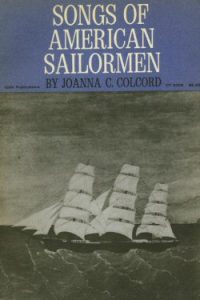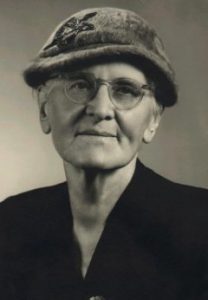Joanna Colcord
Joanna Colcord 1882 – 1960
|
|
Joanna Colcord was born March 12, 1882, in the South Seas on the bark Charlotte A. Littlefield, out of Searsport, Maine, of which her father was captain.
“Up to the age of eighteen she spent most of her girlhood at sea on board her father’s command, sailing on China voyages; and from this experience she acquired, as if by nature, the essential feeling of ships and the sea. Throughout her youth she lived constantly in an atmosphere of seafaring, in a setting of ocean days, knowing none but the men and women of the sea, seeing nothing but ships and ports about the world, hearing no speech but the nautical vernacular.”
Lincoln Colcord’s “Introduction” to Joanna C. Colcord, Songs of American Sailormen (New York: W. W. Norton, 1938), p. 20-21.
Joanna Colcord’s love for the songs of the sailor grew directly out of these childhood experiences.
“I still recall the thrill of hearing the crew of a British ship lying beside us in Shanghai sing the old shanty “Goodbye, Fare Ye Well”, as they heaved up anchor, and of comprehending for the first time that this was beautiful and distinctive music.”
Joanna Colcord, “Childhood At Sea An Early Education In The Realities Of Life,” Portland Sunday Telelgram and Sunday Press Herald, July 12, 1936.
In 1922 Colcord began formally collecting American songs of the sea. Many of the songs Colcord learned in childhood appeared in the pages of her first book, Roll and Go. She remembered how this came about:
“I went to dinner with some publisher friends, and although I knew nothing of musical notation, came away pledged to begin the research which led to the publication two years later, in 1924, of Roll and Go, a collection of American songs of the sea; and which has ever since furnished a hobby and an interesting use for leisure time.”
From: Joanna Colcord, “Childhood At Sea: An Early Education In The Realities Of Life,” Portland Sunday Telegram and Sunday Press Herald, July 12, 1936.
About the songs in Roll and Go, Colcord said:
“The following examples of these work-songs of the sea are drawn in part from my own memories of the years spent on blue water under sail from 1890 to 1899, mostly on voyages between New York and various ports in the China Sea. In part, they are songs learned from my father, who loved them and sang them well, and whose seagoing began about the year 1874. This makes my versions of the songs later than the “classical” period of shanty-singing, which extended from about 1840 up to the time of the Civil War. I also owe grateful acknowledgement to many shanty-singers still alive, whose names will be found elsewhere, and from whose lips I have taken down many of the songs that follow.”
Joanna C. Colcord, Roll and Go: Songs of American Sailormen (Indianapolis: The Bobbs-Merrill Company, 1924)
 |
Colcord’s seafaring knowledge is embodied in her three books:
- Roll and Go: Songs of American Sailormen, 1924
- Reissued as: Songs of American Sailormen, 1938
- American English, Sea Language Comes Ashore, 1945 [a study of nautical terms]
Colcord originally wanted to publish Roll and Go under the name J. C. Colcord in order to disguise the fact that a woman had collected these songs. Her brother Lincoln wrote to her to dissuade her:
“And now I sit me down to complain of your decision and your arguments as to the way your name is to stand on the title page-neither are worthy of you, Nan—you deliberately propose to dodge your sex for obscure psychological reasons. Not a reason you give will hold water for a minute. There is no objection at all to having a woman collect a volume of sea poetry. No reader would raise a question about it for a moment. There is no objection to a woman’s having been to sea; it only adds to the interest of the occasion. Here is something new, a real sailor-woman. . . . You have a good right to your sailor knowledge, and I am proud of it whenever I think of you. You ought to glory in it, and make all the capital there is of it.”
Letter quoted in Parker Bishop Albee, Jr., Letters from Sea, 1882-1901: Joanna and Lincoln Colcord’s Seafaring Childhood (Gardiner, Maine: Tilbury House Press, 1999).
Colcord was a very well-educated woman. She earned a Master’s Degree in Chemistry from the University of Maine and attended the New York School of Philanthropy. She worked for the Russell Sage Foundation and other philanthropic organizations in New York City between 1911 and 1944, in addition to documenting sailor’s songs. In 1950, when Colcord was 68 years old, she got married for the first time to a longtime friend, Frank John Bruno, and moved with him to St. Louis, Missouri, where she died in 1960.

